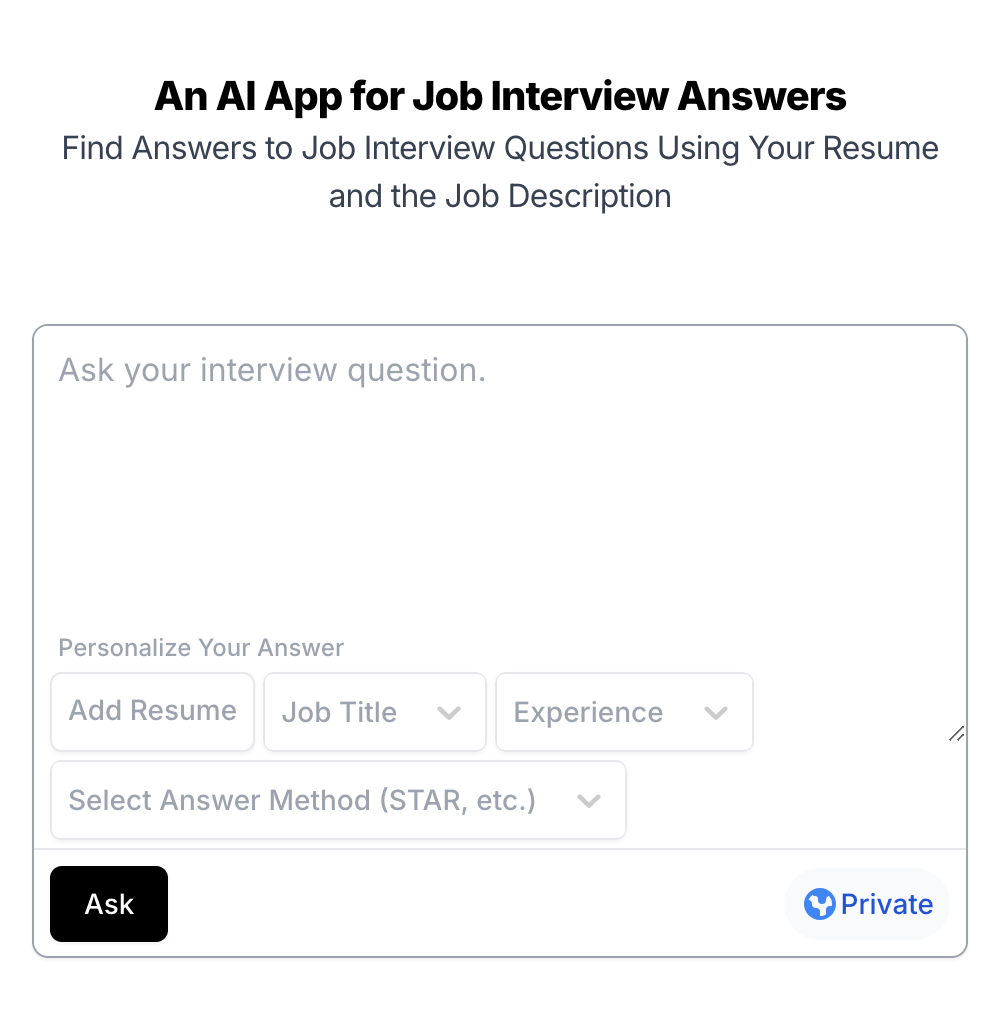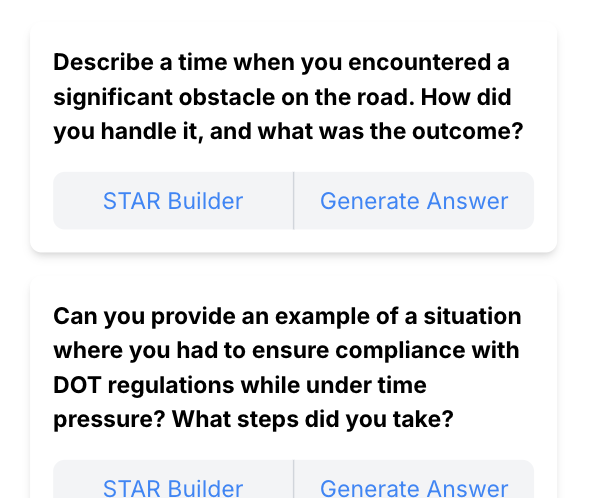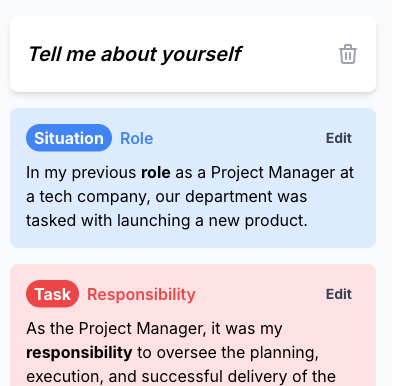
Hypothetical Interview Questions: What You Need to Know
Fri Aug 23 2024•Author: InterviewPro AI
Table of Contents
- What Are They?
- Common Examples
- Answer Length
- What to Avoid Saying
- Possible Follow-Ups
- More Follow-Up Questions
- When They're Asked
- Who Asks Them
- Why They Matter
- How to Answer Well
- Answer Structure
What Are They?
Hypothetical questions ask how you'd handle made-up situations. Employers use them to see how you solve problems, make decisions, and deal with tough scenarios. They want to know how you think and approach work challenges.
5 Common Examples
- How would you handle a disagreement with your manager?
- What would you do if you caught a coworker stealing?
- How would you prioritize multiple urgent tasks with conflicting deadlines?
- If you had to explain our product to a five-year-old, how would you do it?
- What would you do if a client was unhappy with your work?
Answer Length
Try to keep your answer to about 1-2 minutes. This gives you enough time to explain your thoughts without talking too much. Your answer shows how you solve problems, so keep it short and clear.
What to Avoid Saying
Don't say these things when answering hypothetical questions:
-
Don't give very short answers Bad example: "I'd just fire them." (when asked how to handle an underperforming employee) Why it's bad: This doesn't show how you think or solve problems.
-
Don't say it would never happen Bad example: "That would never happen in my department." Why it's bad: This shows you can't think creatively or adapt.
-
Don't suggest anything unethical or illegal Bad example: "I'd cover up the mistake to avoid getting in trouble." Why it's bad: This makes you look dishonest and untrustworthy.
-
Don't say you don't know without trying Bad example: "I have no idea how I'd handle that." Why it's bad: This suggests you can't solve problems or won't try.
-
Don't go against company values Bad example: "I'd ignore company policy and do what I think is best." Why it's bad: This shows you might not fit in with the company culture.
-
Don't give an answer without explaining why Bad example: "I'd just outsource the whole project." Why it's bad: The interviewer wants to know how you think, not just your final decision.
-
Don't show a lack of teamwork Bad example: "I'd tell my coworkers to figure it out themselves." Why it's bad: This suggests you might not work well with others.
Show that you can solve problems, make good choices, and think quickly in a professional way.
Possible Follow-Ups
After you answer, the interviewer might ask more about your thinking. They could ask about:
-
Your reasons: They might want to know why you chose that approach. Example: "Why did you decide to handle the situation that way?"
-
Other options: They could ask what else you thought about doing. Example: "What other options did you consider before settling on this approach?"
-
Possible problems: They might ask what could go wrong with your solution. Example: "What challenges do you think you might encounter with this approach?"
-
Real experiences: They could ask if you've dealt with similar things before. Example: "Have you ever encountered a situation like this in your previous roles?"
-
Working with others: They might ask how you'd involve your team. Example: "Who else would you involve in implementing this solution?"
-
Long-term effects: They could ask how your decision might affect things later. Example: "How do you think this solution would affect the team or company in the long run?"
5 More Follow-Up Questions
- "How would you measure the success of your approach?"
- "What would you do if your initial solution didn't work?"
- "How would you communicate your plan to stakeholders?"
- "What resources would you need to implement your solution?"
- "How would you handle potential resistance to your approach?"
When They're Asked
You might hear these questions at different times:
-
First Phone Call: You might get simple hypothetical questions to see how you solve problems. Example: "How would you handle a situation where you're given conflicting instructions by two different managers?"
-
First Interview: This is when you'll probably get most hypothetical questions, mixed with other types. Example: "If you were given a project with an impossible deadline, how would you approach it?"
-
Later Interviews: You might get harder scenarios here, often about the specific job. Example: "Imagine our biggest client threatens to leave. How would you handle the situation?"
-
Group Interviews: Different people might ask hypothetical questions from various angles. Example: "How would you go about implementing a major change in company policy that you know will be unpopular with employees?"
-
Group Tasks: In team exercises, you might solve hypothetical problems together. Example: "Your team has been tasked with launching a new product in a highly competitive market. How would you approach this challenge?"
These questions can come up at any time, depending on who's interviewing you and what job you're applying for.
Who Asks Them
-
HR People: Example: "How would you handle a situation where you noticed a coworker violating company policy?"
-
Hiring Managers: Example: "If you were given a project with insufficient resources, how would you manage it?"
-
Team Leaders: Example: "How would you motivate a team that's falling behind on its targets?"
-
Potential Coworkers: Example: "If we were working on a project together and disagreed on the approach, how would you handle it?"
-
Top Managers: Example: "How would you go about reducing costs in your department without affecting productivity?"
-
Outside Recruiters: Example: "If you were offered this job, how would you approach your first 30 days?"
The person asking usually chooses questions that fit the job or company culture.
Why They Matter
These questions show how you solve problems, think creatively, and handle unexpected situations. They give employers an idea of how you make decisions and deal with real work challenges. They use these questions to guess how well you might do in situations you haven't faced yet.
How to Answer Well
- Stay calm and think before you speak
- Break the problem into smaller parts
- Explain your thinking as you answer
- Think about different views and solutions
- Connect your answer to what the company cares about
Answer Structure
Use this plan to organize your thoughts:
- Look at the situation: Briefly say how you understand the problem
- Think about factors: Mention what you'd consider
- Choose an action: Say what you'd do and why
- Think about results: Talk about what might happen and how you'd handle it
Hypothetical questions let you show off your problem-solving skills and creativity. Use them to show how valuable you could be to the company. Your answer helps employers guess how well you'd do in the job, so focus on showing a smart way to handle challenges.
Can't find what you're looking for?
Try our AI-Powered Interview Preparation Tools
Prepare for your job interview with our AI tools. Tailored answers, custom questions, and STAR method responses.


